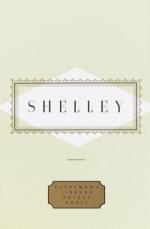’Horses, oxen, have a home,
When from daily toil they come;
Household dogs, when the wind roars,
Find a home within warm doors.’)
233 the Hunt manuscript, editions 1832, 1839; both
Wise manuscript. 234 Freemen Wise manuscript,
Hunt manuscript, editions 1839;
Freedom edition 1832.
235 Dream Wise manuscript, Hunt manuscript, editions
1839;
Dreams edition 1832.
damn]doom editions 1839 only.
248 Give Hunt manuscript, edition 1832;
Given Wise manuscript,
Hunt manuscript cancelled, editions 1839.
249 follow]followed editions 1839 only. 250
Or Wise manuscript, Hunt manuscript; Oh editions 1832,
1839. 254 Science, Poetry, Wise manuscript, Hunt
manuscript;
Science, and Poetry
editions 1832, 1839.
257 So Hunt manuscript, edition 1832;
Such they curse their
Maker not Wise manuscript, editions 1839.
263 and]of edition 1832 only. 274 or]and edition
1832 only.
(Note to end of stanza 67: The following stanza is found (cancelled) at this place in the Wise manuscript:—
’From the cities where from caves,
Like the dead from putrid graves,
Troops of starvelings gliding come,
Living Tenants of a tomb.’
282 sows Wise manuscript, Hunt manuscript;
sow editions 1832, 1839.
297 measured Wise manuscript, Hunt manuscript,
edition 1832;
ne’er-said editions
1839.
322 of unvanquished Wise manuscript;
of an unvanquished Hunt
manuscript, editions 1832, 1839.
346 slay Wise manuscript; Hunt manuscript, editions
1839;
stay edition 1832.
357 in wars Wise manuscript, Hunt manuscript, edition
1832;
in the wars editions
1839.
NOTE ON THE MASK OF ANARCHY, BY MRS. SHELLEY.
Though Shelley’s first eager desire to excite his countrymen to resist openly the oppressions existent during ‘the good old times’ had faded with early youth, still his warmest sympathies were for the people. He was a republican, and loved a democracy. He looked on all human beings as inheriting an equal right to possess the dearest privileges of our nature; the necessaries of life when fairly earned by labour, and intellectual instruction. His hatred of any despotism that looked upon the people as not to be consulted, or protected from want and ignorance, was intense. He was residing near Leghorn, at Villa Valsovano, writing “The Cenci”, when the news of the Manchester Massacre reached us; it roused in him violent emotions of indignation and compassion. The great truth that the many, if accordant and resolute, could control the few, as was shown some years after, made him long to teach his injured countrymen how to resist. Inspired by these feelings, he wrote the “Mask of Anarchy”, which he sent to his friend Leigh Hunt, to be inserted in the Examiner, of which he was then the Editor.




